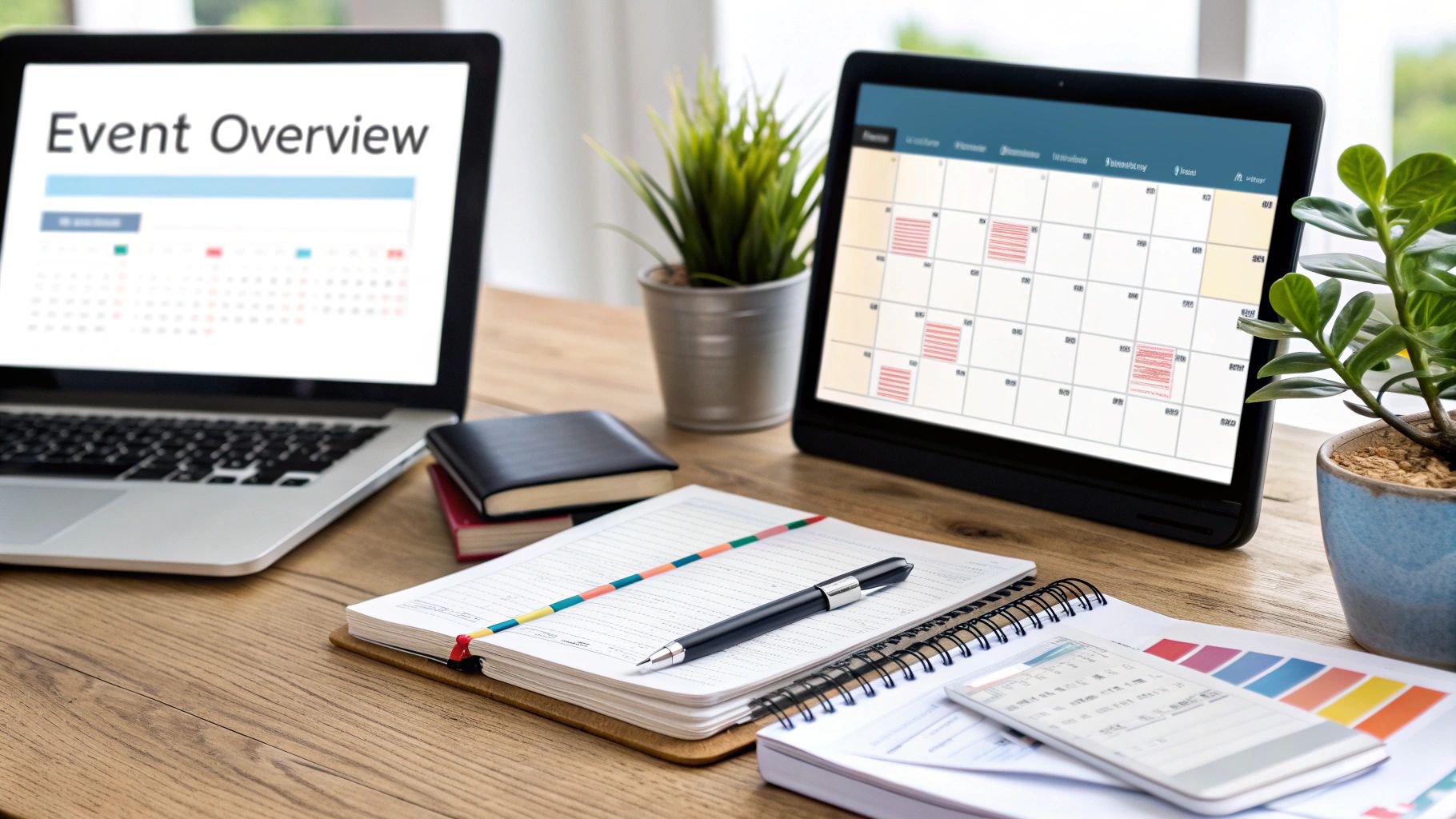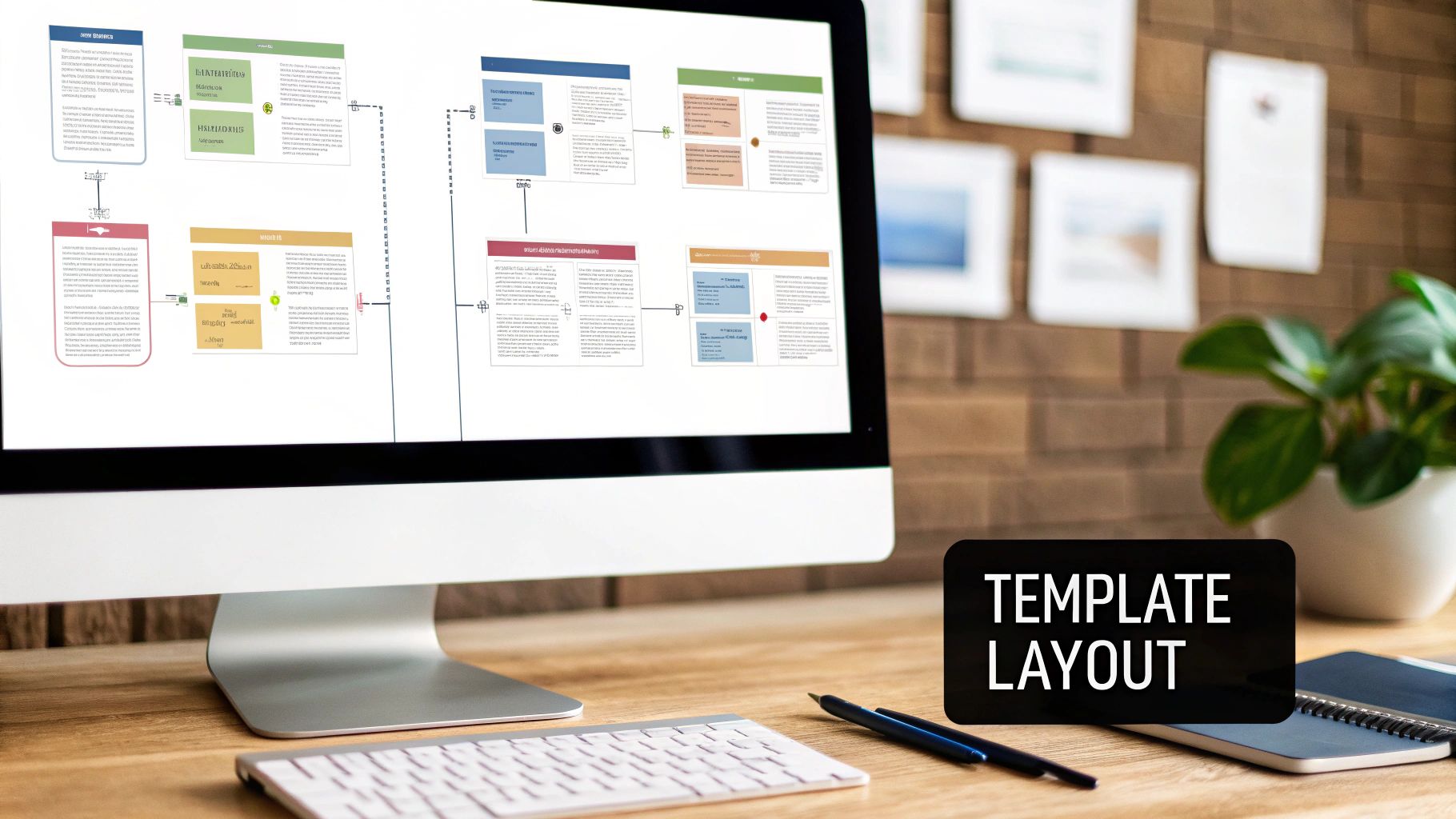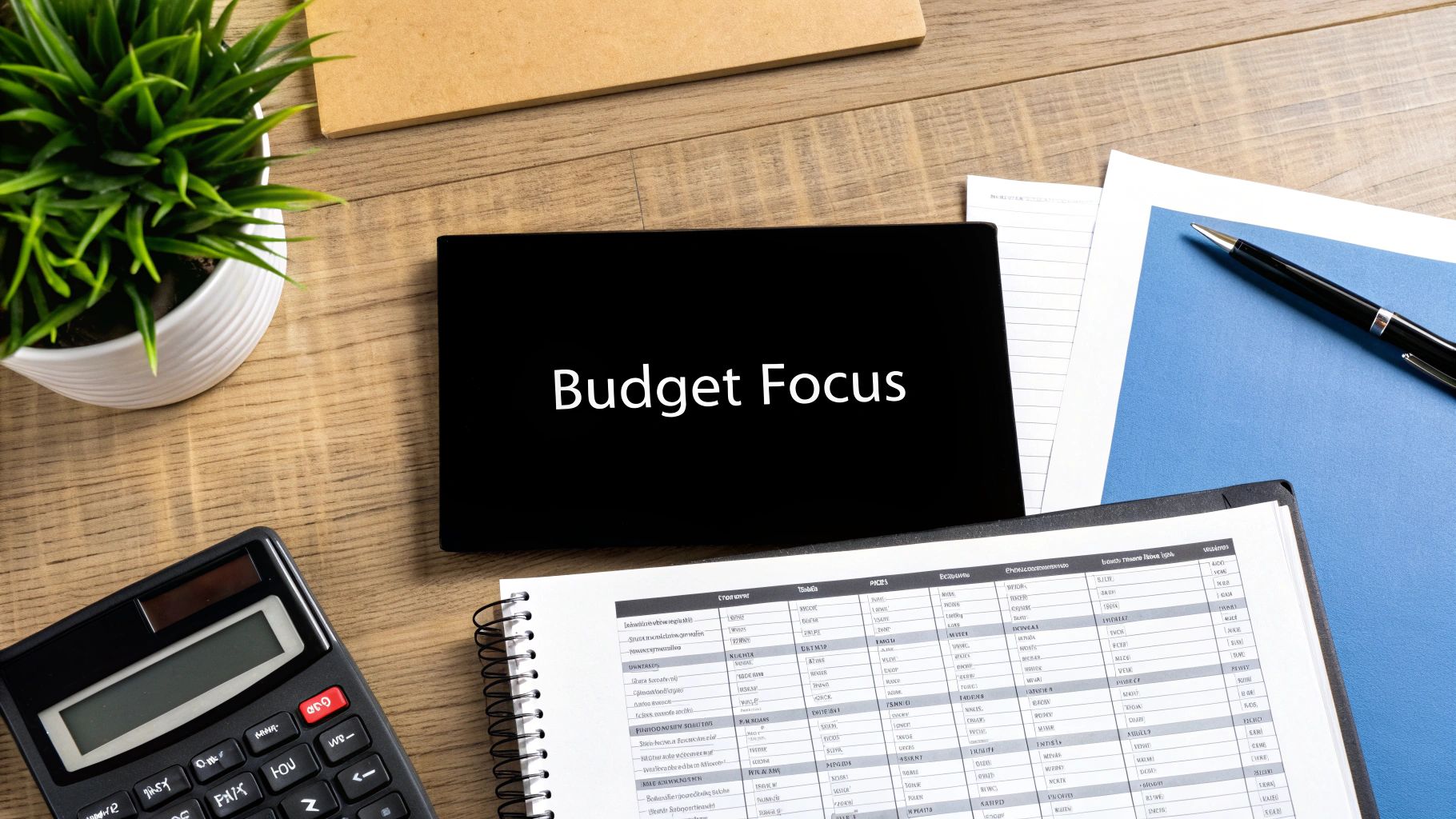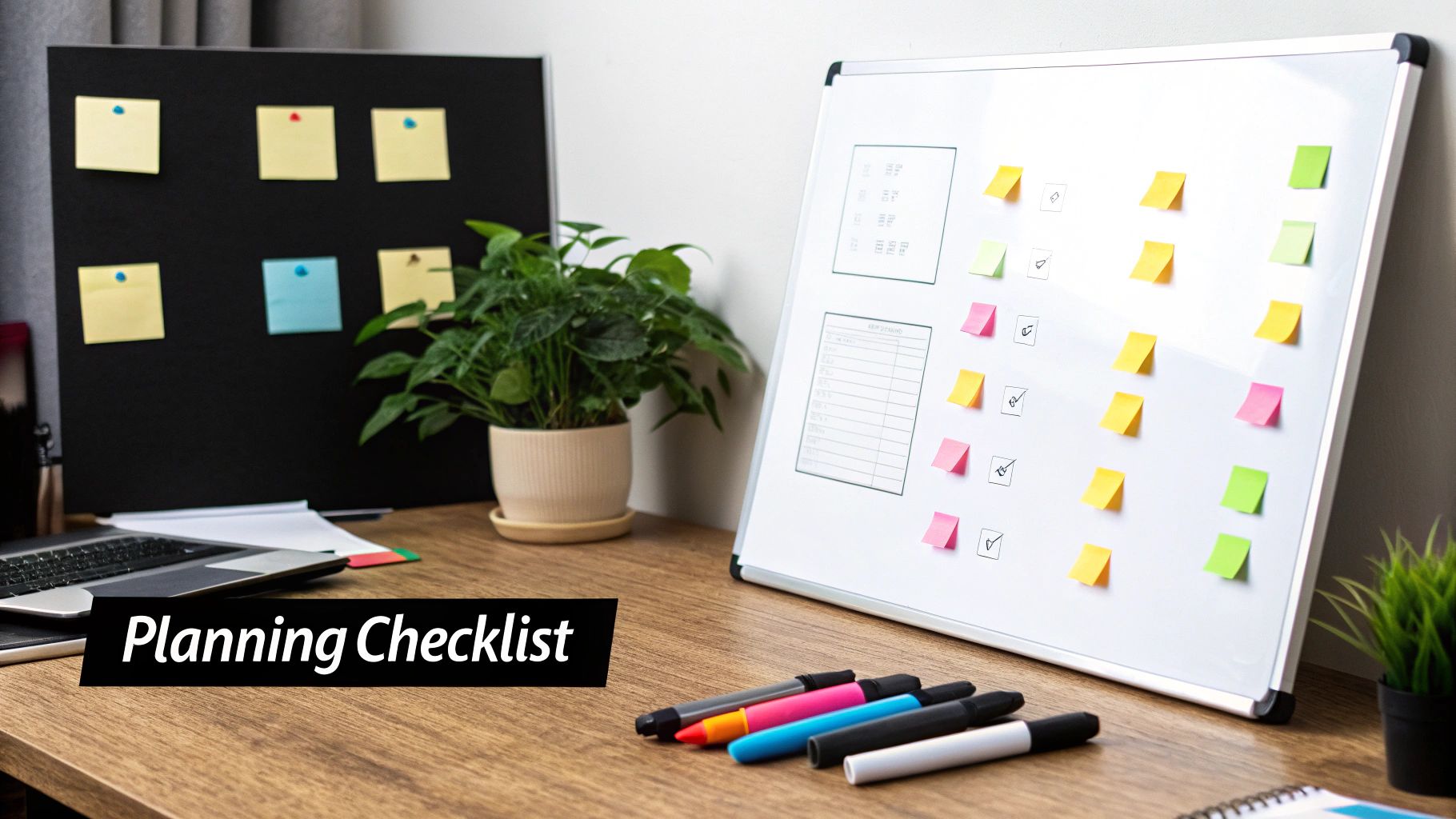Why Every Successful Event Relies on a Strategic Timeline

Want to throw an event that people will actually remember (for the right reasons)? The secret sauce isn't just killer entertainment or a fancy venue. It's all about the event planning timeline. Think of it as the conductor of your event orchestra, bringing all the different instruments together in perfect harmony. It’s not just a to-do list, it's a strategic roadmap that guides every decision and action. This proactive approach minimizes those dreaded last-minute scrambles and builds confidence for everyone involved, from the organizers to the attendees.
The Power of Foresight: Preventing Disasters Before They Happen
A well-structured timeline is like having a crystal ball (without the cheesy fortune teller vibes). It lets you spot potential problems before they even happen and create backup plans. Imagine your caterer suddenly backs out. A solid timeline means you’ve probably already built in some buffer time and scoped out alternative caterers. Crisis averted! This foresight transforms potential disasters into minor hiccups. Plus, a clear timeline keeps your team on the same page, working towards a shared vision.
Timelines: More Than Just a Checklist, a Management Tool
Creating a rock-solid event planning timeline is your key to success. A comprehensive timeline maps out all the tasks and milestones over a set period, sometimes up to 12 months for larger events. This framework helps coordinate multiple teams, track tasks, and keep an eye on the budget. Want to learn more about effective event planning timelines? Check out this helpful resource: Event Planning Timeline. This structured approach takes a simple checklist and turns it into a powerful management tool, ensuring smooth and efficient execution.
Building Confidence and Clarity Through Structure
A strategic timeline doesn’t just handle logistics; it also offers some serious psychological benefits. The clarity it provides reduces anxiety for everyone involved. Knowing exactly what needs to happen and when empowers your team and builds confidence in the event’s success. This sense of control is invaluable, especially when juggling complex events with tons of moving parts. A well-defined timeline isn't just about organization; it's about creating a positive and productive atmosphere.
From Concept to Completion: The Timeline's Guiding Hand
A great timeline is your trusty sidekick throughout the entire event journey, from the initial brainstorming session to the final wrap-up and even post-event analysis. It's a living document that adapts to changes and serves as a constant reference point. This ensures that every aspect of the event, from the tiniest details to the overall theme, gets the attention it deserves and is executed according to plan. Ultimately, a strategic timeline is the bedrock upon which truly successful events are built.
Critical Elements That Make Timeline Templates Actually Work
Let's face it, not all event planning timeline templates are born equal. Some are just simple checklists, while others are like dynamic project management tools. What's the secret sauce? The magic lies in the key ingredients they bring to the table. We're breaking down the essential components that transform a basic template into a powerful planning powerhouse, ensuring your event goes off without a hitch.
Strategic Task Categorization
Think of it like packing a suitcase. You wouldn't just toss everything in randomly, would you? You'd organize it into neat categories: clothes, toiletries, gadgets. Effective templates do the same thing with tasks, grouping them strategically. Venue logistics? Check. Catering? Check. Entertainment? Triple check. This structured approach provides a clear overview, making even the most complex project feel manageable.
Milestone Setting
Milestones are like mini-victories along your event planning journey. They keep your team motivated and laser-focused on the big picture. Booking the venue? Huge milestone! Finalizing the guest list? Another win! These checkpoints create a sense of accomplishment and keep everyone on track, preventing that dreaded feeling of being overwhelmed.
Responsibility Assignments
Ever played a game of telephone? It rarely ends well. That's why clear responsibility assignments are crucial. Top-notch timeline templates, like those from Microsoft, help align team members and stakeholders by clearly outlining who's in charge of what. No more confusion, just pure, unadulterated accountability.
Deadline Tracking
Milestones show you how far you've come; deadlines ensure you get there on time. Robust templates make deadline tracking a breeze, preventing those pesky cascading delays. Sending invitations relies on a finalized guest list. One slip-up can trigger a domino effect, jeopardizing the whole shebang. Effective deadline management? Your project's safety net.
Budget Allocation
Let's be real, money talks. A good timeline template isn't just about tasks and deadlines; it's about keeping your finances in check. Integrating budget allocation lets you track expenses against your planned spending, preventing those budget-busting surprises. Need an extra boost? Check out this guide on using a content audit template to polish your event's content and maximize engagement. Want even more? Our sitemap of services has got you covered.
Visual Organization and Customization
A cluttered template is like a messy desk – it hinders productivity. A well-organized one? Pure bliss. Customization flexibility is key too. Your template should adapt to your unique event needs, while maintaining a core structure to keep things tidy. The sweet spot? A user-friendly design paired with rock-solid foundational elements. This dynamic duo empowers you to plan and execute flawless events with confidence and control.
Customizing Timelines for Different Event Categories

Event planning is like orchestrating a symphony, and your timeline is the conductor's score. But a one-size-fits-all template just won't do. A corporate conference has a different tempo than a wedding, and a fundraiser marches to a beat distinct from a product launch. So, how do you tailor your timeline to each unique event? Let's dive in.
Corporate Events: Boardrooms and Brainstorming
Corporate events are often a delicate dance of stakeholder management and approvals. Your timeline needs breathing room for presentations, feedback sessions, and the all-important executive sign-off. For a large conference, you might be looking at a 12-month lead time. Locking down the venue, snagging those keynote speakers, and getting your marketing machine rolling are your critical path items. And what about those unexpected tempo changes? Budget cuts or leadership shuffles can throw a wrench in the works, so be prepared to adapt.
Weddings: From "Yes!" to "I Do"
Weddings are deeply personal events, full of emotion and intricate details. Vendor coordination is paramount – think photographers, caterers, and florists all playing in harmony. Planning typically begins 12-24 months in advance. Two non-negotiables? The venue and the officiant. But even the best-laid plans can encounter hiccups, like vendor cancellations or surprise family drama. For those with a longer engagement, consider this helpful guide on two-year wedding timelines.
Fundraisers: Rallying Support and Resources
Fundraisers are all about engaging donors and mobilizing volunteers. Your timeline should encompass outreach campaigns, meticulous donation tracking, and volunteer scheduling. Planning often kicks off 6-12 months prior to the event. Setting ambitious fundraising goals, securing sponsorships, and coordinating event logistics are your key priorities. Potential roadblocks? Lower-than-expected donor participation or volunteer shortages.
Product Launches: Generating Buzz and Excitement
Product launches demand tight coordination between marketing, sales, and public relations. Your timeline must sync with marketing campaigns, press releases, and pre-order schedules. Planning typically starts 6-18 months out, depending on the product's complexity. Finalizing the product, crafting compelling marketing materials, and securing media coverage are crucial. Potential pitfalls? Production delays or negative press.
Virtual Events: Connecting in the Digital Space
Virtual events present unique challenges, centered on technical requirements and audience engagement. Timelines must account for platform selection, tech rehearsals, and interactive elements. Planning can range from 3-6 months. Choosing the right virtual event platform, creating engaging content, and ensuring technical stability are essential. Risks? Technical glitches or low audience participation.
To help you visualize these timelines, check out this handy comparison:
Timeline Comparison by Event Type
This table compares the recommended planning timelines for different types of events, showing how far in advance key tasks should be completed.
| Event Type | Total Planning Time | Venue Booking | Vendor Selection | Invitations | Marketing Start | Final Confirmations |
|---|---|---|---|---|---|---|
| Corporate Event | 12 months | 9-12 months | 6-9 months | 3-6 months | 6-9 months | 1-2 weeks |
| Wedding | 12-24 months | 12-18 months | 9-12 months | 6-9 months | 9-12 months | 1-2 weeks |
| Fundraiser | 6-12 months | 6-9 months | 3-6 months | 2-4 months | 4-6 months | 1-2 weeks |
| Product Launch | 6-18 months | N/A | Varies | N/A | 6-12 months | 1-2 weeks |
| Virtual Event | 3-6 months | N/A | 2-4 months | N/A | 2-4 months | 1-2 weeks |
As you can see, each event type has its own unique timeline rhythm.
Scaling and Adapting Your Timeline
The scale and budget of your event also influence the timeline. A large-scale event with a hefty budget demands a more detailed and extended timeline than a smaller, more intimate affair. Want to explore more? Check out this article about different event categories. Remember, flexibility is essential. Your timeline should be a living document, adapting to the inevitable changes while maintaining its core structure. By understanding the specific needs of each event category and customizing your timeline accordingly, you're setting the stage for a truly spectacular event.
Digital Tools That Transform Timeline Management

Say goodbye to dusty binders and static spreadsheets! Today's event planning world thrives on dynamic digital tools that not only streamline timelines but also supercharge collaboration. From trusty spreadsheets to powerful project management platforms, picking the right digital tools can be the difference between a flawless event and a flop. So, let's dive in and explore how to unlock the potential of these tools to create a truly seamless planning process.
Project Management Powerhouses: Asana, Trello, and Monday.com
For complex events with a million moving parts, project management software like Asana, Trello, and Monday.com are absolute game-changers. These platforms let you break down your event planning timeline template into individual tasks, assign responsibilities, set deadlines, and monitor progress, all within a single, centralized hub.
Imagine creating a task for "Book Venue," assigning it to a team member, setting a due date, and even attaching important documents like contracts or floor plans. That's the kind of organization that keeps everyone on the same page and ensures nothing slips through the cracks. However, these tools can sometimes have a bit of a learning curve. Choosing the right platform depends on your team's tech skills and how intricate your event is.
Spreadsheet Savvy: Excel and Google Sheets
Don't dismiss the power of those familiar spreadsheet programs! Excel and Google Sheets offer some seriously useful features for timeline creation, especially for smaller events or tighter budgets. Think conditional formatting and data validation – these features can transform a basic spreadsheet into a dynamic planning powerhouse.
For example, color-coding tasks based on their completion status gives you a clear visual snapshot of your progress. Many event planners swear by templates to make this process even smoother. For instance, Smartsheet offers event planning templates in various formats, including Excel and Google Docs, which are widely used for tracking progress and keeping things on schedule. This just goes to show that a well-structured timeline is more than a checklist; it's a dynamic tool for efficient event execution. Want more insights into event planning timelines? Check out this helpful article: Event Planning Timeline. Plus, Google Sheets' collaborative features allow for real-time updates and seamless teamwork.
Event-Specific Software: Streamlining Niche Needs
For specific types of events, like weddings or conferences, specialized software can offer some seriously targeted features. These platforms often include vendor databases, budgeting tools, and guest list management capabilities. While these tools can be incredibly helpful, they might not be essential for every event. Think about your specific needs and whether the extra features justify the cost and learning curve.
Cloud-Based Collaboration: Real-Time Visibility for All
One of the greatest perks of digital tools is the power of cloud-based collaboration. This means everyone involved, from vendors to stakeholders, can access the most up-to-date timeline, wherever they are. This real-time visibility boosts transparency, minimizes communication mishaps, and keeps everyone informed and aligned. However, cloud-based collaboration does rely on a stable internet connection. Having backup plans for offline access is critical, especially for on-site event management.
Choosing the Right Tools for Your Event
At the end of the day, the best digital tools for your event planning timeline template depend on your unique needs and preferences. Consider factors like event size, budget, team size, and technical skills. The goal is to find tools that simplify your workflow, enhance collaboration, and ultimately contribute to a wildly successful event. Don't hesitate to experiment and find the perfect fit for you and your team. This careful selection process ensures you’re using technology to its full potential, transforming timeline management from a tedious task into a streamlined and collaborative experience.
Free Vs. Premium Timeline Templates: Making the Right Investment
Choosing the right event planning timeline template can be a real headache. With so many options out there, how do you know where to best invest your precious time and resources? This section breaks down the pros and cons of free versus premium templates, helping you pick the perfect match for your event needs. We'll explore what free templates offer and when they're enough, plus the perks of premium versions and when they can truly save the day.
When Free Templates Shine: Simplicity and Structure
Free event planning timeline templates are a great jumping-off point, especially for smaller events or those on a tighter budget. They give you a basic framework and help you get organized without spending a dime. These templates usually include the essentials like task lists, deadlines, and milestones. This foundation is super helpful for simple events like birthday parties, small workshops, or neighborhood get-togethers.
Plus, free templates are easy to find online, giving you quick and easy access. Many websites, like Fielddrive, offer user-friendly templates that simplify task management. These resources sometimes include features like color-coded swimlanes for different project phases, making it easy to visualize your tasks. This accessibility makes them ideal for event planning newbies or those managing less complicated projects.
Premium Features: Power and Efficiency
Free templates are great for basic organization, but premium templates bring some serious firepower to the table, especially for larger or more complex events. They often come with automated reminders, dependency tracking (knowing which tasks rely on others), and smooth integration with other software.
Imagine getting automated reminders for upcoming deadlines or having your timeline automatically adjust when a task gets delayed. Pretty slick, right? This dynamic functionality keeps your planning flexible and everyone in the loop. These advanced features can be a lifesaver for large conferences, weddings, or corporate events where coordination is key. Check out our portfolio for some inspiration!
Making the Right Investment: Balancing Needs and Budget
So, free or premium? The answer lies in your specific needs and budget. Think about the size and complexity of your event, your team's tech skills, and how much collaboration is involved.
Here's a handy table to help you out:
| Feature | Free Template | Premium Template |
|---|---|---|
| Basic Task Management | Yes | Yes |
| Automated Reminders | No | Often |
| Dependency Tracking | No | Often |
| Software Integrations | Limited | Often |
| Customization Options | Basic | Advanced |
| Support Resources | Limited | Usually |
| Cost | Free | Varies |
If you're planning a small, straightforward event, a free template might be all you need. But if you're tackling a large, complex event with lots of moving parts and a bigger budget, a premium template can be a game-changer. It can save you time, reduce stress, and boost efficiency. Choosing wisely means having the right tools to plan and execute a truly memorable event. By weighing these factors, you'll make a smart decision that maximizes your resources and sets your event up for success.
Transforming Generic Templates Into Personalized Planning Tools

Even the best event planning timeline template needs that extra oomph. Think of it like a suit – the basic structure is there, but it needs tailoring to fit perfectly. This section offers a practical guide to turning any generic template into a personalized planning powerhouse. We'll walk you through refining your template to match your event’s specific needs, from initial assessment all the way to incorporating feedback and rolling with the punches (because let's be real, unexpected things always happen).
Assessing Your Event's Unique Needs
First things first: understand your event inside and out. What kind of shindig are we talking about? A buttoned-up corporate conference? A fairytale wedding? A glitzy fundraising gala? Each event has its own vibe and needs a unique approach. For example, a wedding timeline might prioritize vendor coordination and guest list management, while a corporate event focuses on stakeholder approvals and logistical details.
Adjusting Timeframes and Incorporating Critical Tasks
Generic templates often use standard timeframes. But what if your venue has a longer lead time than the template suggests? Or your keynote speaker needs more prep time? No problem! Adjust those timeframes! Incorporate the critical tasks specific to your event. This personalized approach ensures your timeline accurately reflects the reality of your event.
Integrating Team Feedback and Maintaining Clarity
Planning an event is a team sport. Getting feedback from your team is crucial. But too many cooks can spoil the broth. Establish clear communication channels and use version control (Google Docs is great for this!). This ensures everyone stays informed and prevents a chaotic mess of conflicting edits.
Adapting to Change: Staying Flexible Without Losing Momentum
Unexpected curveballs are part of the event planning game. Your caterer might cancel, a speaker could drop out, or a sudden budget change could throw a wrench in the works. A good event planning timeline template is flexible enough to handle these hiccups. Build in buffer time for critical tasks and establish clear protocols for handling changes. This adaptability keeps you on track, even when things get a little crazy.
Creating Reusable Frameworks for Recurring Events
Do you plan similar events regularly? Transform your personalized template into a reusable framework. After each event, do a post-mortem. What worked? What didn't? Incorporate these lessons learned into your template, constantly refining it. This creates a cycle of continuous improvement, making each event smoother and more successful than the last.
Common Customization Pitfalls to Avoid
Don't overcomplicate your template. Too much detail can make it clunky and overwhelming. Another pitfall is neglecting team feedback. Remember, collaboration is key! By avoiding these common mistakes and following the steps outlined above, you'll create an event planning timeline template perfectly tailored to your needs, setting the stage for a truly unforgettable event. This personalized approach ensures your timeline is a dynamic tool, empowering you to navigate the planning process with confidence and efficiency.
Turning Your Timeline Into a Powerful Team Alignment Tool
A killer event planning timeline template is just a pretty document without a team that actually uses it. This section dives into transforming your timeline from a static page into a dynamic, collaborative tool that powers your event from start to finish. Think of it as the central nervous system, keeping all those moving parts in sync.
Securing Stakeholder Buy-In
Getting everyone on board, especially those clinging to less structured ways, is mission-critical. Clearly communicate the timeline's advantages, highlighting how it simplifies work and dials down the stress. For instance, showcase how defined roles and responsibilities minimize confusion and those dreaded last-minute scrambles. This proactive approach builds shared ownership and sets the stage for smooth sailing.
Establishing Effective Communication Protocols
Keeping your timeline relevant without endless meetings requires communication smarts. Regular check-ins, laser-focused on progress and potential roadblocks, are essential. Leverage project management software like Asana or shared online docs like those in Google Workspace for real-time updates and transparent communication. This keeps everyone informed without drowning them in meetings.
Implementing Effective Review Cycles
Regular reviews are like health checkups for your timeline. They keep things on track and allow for tweaks based on progress or unexpected hiccups. For large-scale events, think weekly reviews. Smaller events might thrive with bi-weekly or monthly check-ins. This catches potential problems early and ensures smooth progress towards those event goals. Read also: Exploring Different Event Cases.
Troubleshooting Common Implementation Challenges
Let's be real, not every implementation is a fairytale. Resistance to change, communication breakdowns, and unexpected delays happen. Tackle them head-on. Foster open conversations to address concerns and support team members adapting to the new system. This creates a collaborative environment and promotes proactive problem-solving.
Balancing Accountability With Flexibility
Accountability is crucial, but flexibility is its equally important counterpart. Life throws curveballs. A vendor might bail, a speaker might get sick, or budget shifts might necessitate changes. Your timeline needs to roll with the punches, allowing modifications without derailing the entire plan. This adaptability ensures your timeline remains a relevant and valuable tool throughout the event's lifecycle.
Utilizing the Timeline as an External Communication Tool
Your timeline isn't just for internal eyes. It's a powerful tool for keeping clients, vendors, and partners in the loop. Sharing relevant sections fosters transparency, builds trust, and ensures everyone's on the same page, leading to a smoother, more collaborative planning process.
Post-Event Timeline Evaluation: A Learning Opportunity
After the dust settles and the confetti's swept away, take time to assess your timeline's performance. What worked? What could be better? This post-event analysis turns every event into a learning experience, allowing you to refine your planning process and craft even better timelines for future events. This continuous improvement cycle is your key to event planning mastery.
To help illustrate this, let's take a look at a sample timeline:
Event Planning Timeline Milestones
This table outlines critical milestones in a standard event planning timeline, with recommended timeframes and key considerations for each stage
| Timeline Stage | Months Before Event | Critical Tasks | Common Pitfalls | Success Indicators |
|---|---|---|---|---|
| Define Objectives & Budget | 12-18 | Establish event goals, budget, and target audience. | Unrealistic goals, inadequate budget. | Clear objectives, approved budget. |
| Venue & Vendor Selection | 9-12 | Secure venue, caterer, entertainment, and other vendors. | Limited venue availability, vendor conflicts. | Confirmed bookings, signed contracts. |
| Marketing & Promotion | 6-9 | Develop and execute marketing plan, including invitations. | Ineffective marketing, low registration rates. | Strong registration numbers, buzz. |
| Logistics & Coordination | 3-6 | Finalize event details, coordinate with vendors. | Communication breakdowns, logistical errors. | Smooth vendor communication, detailed plan. |
| On-Site Management | 1-2 | Manage on-site logistics, ensure smooth execution. | Last-minute issues, attendee dissatisfaction. | Seamless event flow, positive feedback. |
| Post-Event Evaluation | 1-2 weeks after | Analyze event performance, gather feedback. | Lack of follow-up, missed learning opportunities. | Actionable insights, improved future events. |
As you can see, breaking down the planning process into manageable stages with key deliverables and potential pitfalls can greatly increase the chances of event success.
Ready to transform your next event? 1021 Events offers expert planning and production services, ensuring your vision becomes a reality. From stunning visuals to seamless logistics, we handle every detail, so you can enjoy the experience. Visit us at 1021 Events to learn more and create an unforgettable event.




